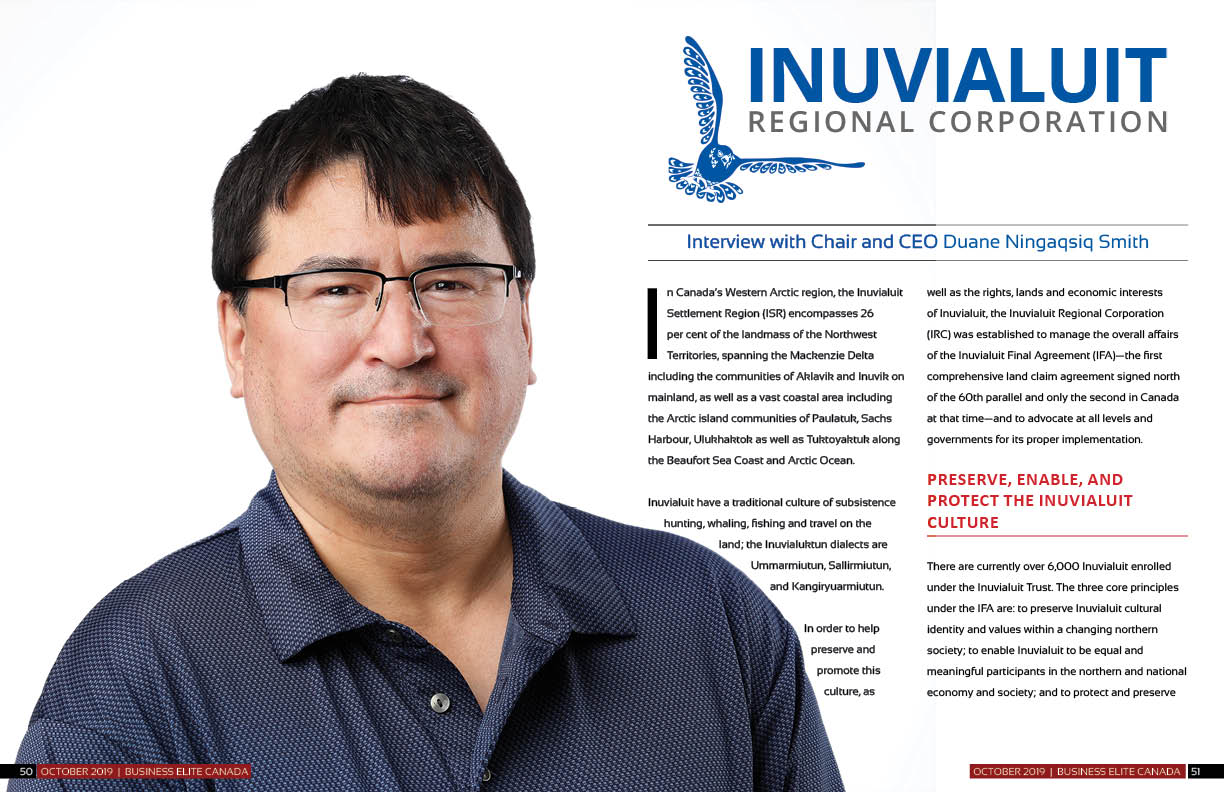Interview with Chair and CEO Duane Ningaqsiq Smith
By Anna Guy
In Canada’s Western Arctic region, the Inuvialuit Settlement Region (ISR) encompasses 26 per cent of the landmass of the Northwest Territories, spanning the Mackenzie Delta including the communities of Aklavik and Inuvik on mainland, as well as a vast coastal area including the Arctic island communities of Paulatuk, Sachs Harbour, Ulukhaktok as well as Tuktoyaktuk along the Beaufort Sea Coast and Arctic Ocean.
Inuvialuit have a traditional culture of subsistence hunting, whaling, fishing and travel on the land; the Inuvialuktun dialects are Ummarmiutun, Sallirmiutun, and Kangiryuarmiutun.
In order to help preserve and promote this culture, as well as the rights, lands and economic interests of Inuvialuit, the Inuvialuit Regional Corporation (IRC) was established to manage the overall affairs of the Inuvialuit Final Agreement (IFA)—the first comprehensive land claim agreement signed north of the 60th parallel and only the second in Canada at that time—and to advocate at all levels and governments for its proper implementation.
Preserve, Enable, and Protect the Inuvialuit Culture
There are currently over 6,000 Inuvialuit enrolled under the Inuvialuit Trust. The three core principles under the IFA are: to preserve Inuvialuit cultural identity and values within a changing northern society; to enable Inuvialuit to be equal and meaningful participants in the northern and national economy and society; and to protect and preserve the Arctic wildlife, environment and biological productivity.
IRC Chair and CEO Duane Smith tells Business Elite Canada that inherent to his larger work is keeping the next generation of Inuvialuit informed about the IFA. Celebrations of the 35th anniversary of the signing successfully held in three urban centres where many Inuvialuit now reside in Yellowknife, Whitehorse, and Edmonton were a continuation of this hope, and an extension of inclusiveness to all Inuvialuit.
That all Inuvialuit beneficiaries should know the IFA is a major objective of the IRC. “We want to honour those who had the insight and wisdom to negotiate this land claim,” says Smith. “All Inuvialuit should celebrate but also know the particulars of this achievement, so we all can implement its principles and objectives in the best, strongest, way possible going forward.”
“The chance to get together on this 35th year of signing is a chance for all those gathering to come together and experience our drum dancing, our Inuvialuit Northern Games and share our Traditional foods,” says Smith. “Quyanainni, Quana, Quyanaqpak (which means “thank you” in English) to all Inuvialuit who came out to mark the anniversary with their participation and to those who donated their time and resources to this effort.”
Working for Future Generations
The IRC works for its community members and future generations of Inuvialuit through both business development and support services, but also with direct compensation as a returned annual disbursement of Dividends to all shareholders of the Inuvialuit Trust, a well as additionally providing an Elders distribution to all Inuvialuit Elders (60 years and over) each December. These direct payments are in addition to education scholarships, charitable and foundational funds established—the Inuvialuit Education Foundation (IEF), training, support in the form of wellness programs and health, Inuvialuit Harvesters Assistance Program (IHAP), and many other initiatives.
“IRC is pleased to provide consistent financial distributions to Inuvialuit beneficiaries,” says Smith. “These financial benefits are a fundamental objective of the IFA and are provided in accordance with the IRC Distribution Policy in order to ensure sufficient reinvestment of profits to guarantee the preservation and growth of the land claim capital.”
Canadian North
In an effort to empower progress and enable Inuit to become meaningful participants in both the Northern and national economies, IRC helped to create the first sustainable Pan-Arctic airline, Canadian North, in partnership with Makivik Corporation.
The new, Pan-Arctic airline is meant to allow Northerners to meet economic realities in the North and realize the operational efficiencies needed to ensure vital services are met, and financially viable, in order to meet the steadfast goal of quality, sustainable air services at competitive prices for Inuvialuit, Inuit, and in order to bridge gaps in living conditions and opportunity.
“Our beneficiaries can look forward to training and job opportunities, best rates, as well as community support in the form of donations, and cargo organized and moved in a way that makes sense for Northern communities and residents,” says Smith. “This Inuit-led achievement was made possible by investment of time and diligent leadership and was long sought in order to best meet needs for service, connectivity, reliability, safety, environment, and self-determination.”
The planning process has just begun, and while the full effects of this merger will take time, we are excited to see what such a large, 100 per cent-Inuit-owned company can do for Northerners and Canada.”
Going into his second term as Chair and CEO, Duane says his goals are to deliver on the direction from IRC leadership being put forward in a three-year strategic plan surrounding everything from culture and language, to education and economic development, human resources, and with an emphasis on land management, and promoting and strengthening Inuvialuit rights.
IRC will work diligently for its beneficiaries. Says Smith, “We will continue to implement the IFA and educate the world at large, while continuing to have dialogue with governments. This work is all to advance the collective interests of Inuvialuit.”
For more information on the IFA, please visit www.ifa101.com






